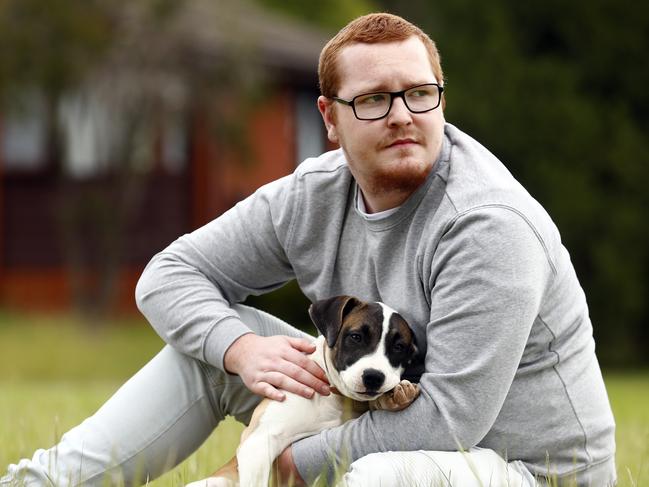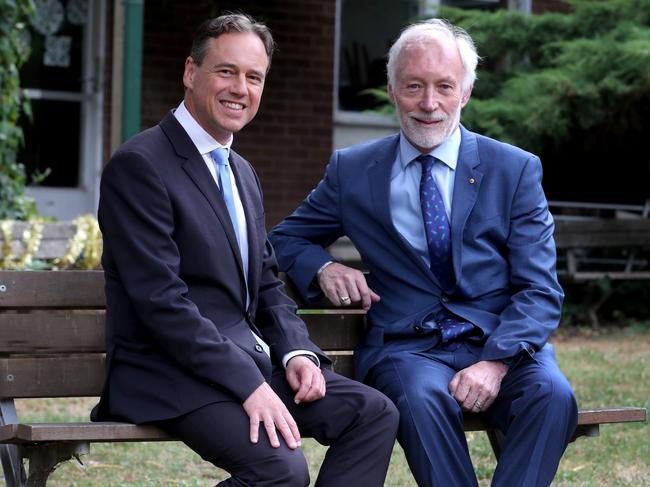Funding for youth mental health organisation headspace at risk
A youth mental health program run by well-known organisation headspace — which has rescued thousands of young people from the dole queue, isolation and suicide — is at risk of having its funding cut in the upcoming federal budget.
NSW
Don't miss out on the headlines from NSW. Followed categories will be added to My News.
For five years Nicholas lived with two conflicting voices in his head and the fear that the government was out to get him.
The 19-year-old also believed that, after every face-to-face conversation, people would whisper insults about him as they walked away.
This psychological turmoil crippled his HSC, fuelled an 18-month drug addiction and culminated in two suicide attempts.
But the western Sydney man has been given a second chance by a world-leading mental health treatment program as part of organisation headspace which, despite reporting some life-changing results, is in danger of losing funding in October’s federal budget.

“If I didn’t have this treatment I would be out on the streets,” the Lethbridge Park man said of youth mental health organisation headspace’s early psychosis program.
“I always thought it was normal to have two voices and think the government was out to get me. It was awful.”
MORE FROM BEN PIKE:
My violent dad’s suicide shattered me, but his love re-made me
How Joel Brown’s suicide impacted eight of his closest friends and family
Nicholas is managing his schizophrenia via medication and psychological treatment.
He is studying full-time to become a mental health peer support worker – something he says would’ve been impossible when he started treatment a year ago.
“I can’t wait to get into that workforce,” he said.
The program was established in 2012 and targets 12-25-year-olds suffering from severe psychosis like bipolar and schizophrenia.
In the past two years it has treated patients within three weeks of symptoms and driven a 30-35 per cent reduction in psychotic symptoms.
It has also seen a 25 per cent reduction in psychological distress over the first 12 months of treatment, analysis by youth mental health organisation Orygen reveals.
“Our results are the best I’ve seen in 25 years of working in this space and mean that these young people are making much better recoveries than has ever been possible,” Orygen executive director Professor Patrick McGorry said.
“It’s not just getting them well it’s getting them back into education and employment.”
For kids who came into the program not in employment and training, 33-39 per cent (depending on their diagnosis) were in some form of education or employment after 12 months of treatment.

Federal government funding to the program was almost withdrawn in 2016 but – in the wake of a relentless campaign by The Sunday Telegraph – was extended by then prime minister Malcolm Turnbull.
It has since been supported by Health Minister Greg Hunt, who has spoken publicly about his late-mother Kathinka’s long battle with bipolar disorder.
Prof McGorry, the 2010 Australian of the Year, said it was vital the program continue to help an estimated 1000 young people per year.
“Greg Hunt has been very positive about this program and we are hoping that he will make it a permanent part of the landscape and extend it to other parts of Australia,” Prof McGorry said.
“It runs out of funding next June so it (funding) needs to happen in the October budget otherwise the programs will run down and people will start to leave.”
The program exists in six sites around the country, including one in Western Sydney, and costs about $60 million per year.
Prof McGorry said there is scope to expand the program to 20 sites, including at least five in NSW.
A spokesman for Health Minister Greg Hunt said the government is strongly committed to the program.
“Indeed in December 2018, Minister Hunt was pleased to announce an additional $110m over two years (2019-20 and 2020-21) for the Early Psychosis Youth Services (EPYS) Program, which aims to reduce the incidence and impact of severe mental illness in young people,” he said.
“The current funding round has nearly a year to run and will be subject to an independent assessment as has always been the case.
“The government’s intention is to continue this program with funding to be considered in the appropriate budget cycle.”
* LIFELINE: 13 11 14; headspace.org.au
